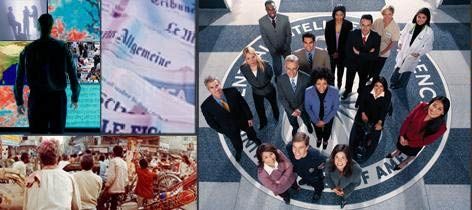CIA Seeks Anyone, Anyone Who Can Speak 2 Languages

WASHINGTON, D.C. — Many Americans don't learn a second or a third language from birth, let alone a language that the CIA or U.S. Foreign Service might want. The situation has forced U.S. government agencies to learn how to cultivate the most talented second-language speakers from among college students with little to no other-language expertise.
But experts who help select and train raw talent also see an opportunity in the mass of recruits who start out speaking only English. That's because the U.S. represents a living laboratory for observing how adult brains change over time as they struggle to adapt to the new grammar and vocabulary of a second language.
"In U.S. education, we don't develop early bilinguals," said Catherine Doughty, a language expert at the University of Maryland. "We're dealing with monolinguals or people who have only studied foreign language, so that they don't really have any proficiency."
Doughty spoke as part of a panel on Feb. 19 during the American Association for the Advancement of Science (AAAS) conference in Washington, D.C. She and other speakers described the typical U.S. second-language program as being a series of disjointed classes where students often repeated what they had learned before.
"Imagine math [programs] where the middle school says, 'We don't have any idea about what you studied,' so you learn it again. It's the same with high school," said Robert O. Slater, director of the U.S. National Security Education Program.
That situation drove Slater and the government to develop a flagship program for finding the most promising college students and putting them through intensive language learning. Yet researchers have just begun to figure out how to predict the most promising language students, and how to measure their progress.
The CIA has aimed to boost its ranks of foreign language speakers, with a special focus on recruiting speakers of Arabic, Chinese, Dari, Korean, Pashtu, Persian, Russian and Urdu.
Sign up for the Live Science daily newsletter now
Get the world’s most fascinating discoveries delivered straight to your inbox.
One nation under English
American schools currently don't graduate enough people fluent in French and Spanish and other Romance languages, let alone languages such as Chinese, Korean and Russian, which pose greater challenges for native English speakers, Slater said.
"The flagship model is confounded by the reality that very few first years show up with any appreciable language skills," Slater explained. "Most language learning at the undergrad level is not proficiency- based."
Ten years ago, the flagship program recruited post-college graduates with moderate training and put them through intensive language learning in the United States, before sending them abroad for a year. But the flagship program was re-engineered five years ago to focus instead upon motivated undergraduates.
Current estimates suggest that not even 20 percent of Americans speak at least two languages. Among that population, the government must find its multilingual recruits from a much smaller pool of candidates who are willing and able to serve.
Finding the best
Government agencies aren't alone in trying to recruit multilingual speakers; U.S. corporations covet such skills for doing business in the era of globalization. Some companies have asked language research centers, such as the one headed by Doughty, for help in training the most promising employees.
"We try to train up language athletes by selecting those with talent," Doughty said.
Doughty and her colleagues used tests to train up cognitive processes related to language learning, such as the ability to hold information in the brain while using it for learning. They then confirmed that the training's effects left a lasting impression in the brains of candidates even after several months.
Eventually the researchers hope to create a test that can identify those candidates with the greatest language-learning potential. They have begun comparing cognitive factors among promising candidates with those of people who are already fluent multilingual speakers, and are currently tracking the success rates of the first batch of candidates.
"[The battery of aptitude tests] seeks to predict those who can succeed despite everything stacked against them," Doughty said.
Changes in the brain
At least one panel member saw a silver lining to the late language-learning challenge. The United States represents an ideal lab for seeing how the brain changes in response to language learning, because so many Americans start out speaking just one language, said Lee Osterhout, a cognitive neuroscientist at the University of Washington in Seattle, during an interview following the panel session.
"They're like a blank slate," Osterhout told LiveScience.
Osterhout's lab has used electrodes placed on the scalp to measure the electrical activity created by the signals of brain cells. That allows the researchers to see differences in the brain patterns among language learners and fluent speakers – and to find some surprising results.
Repeated studies of French language students showed that their brains responded differently to real French words compared with fake words after just two weeks of classes, even if the students themselves could not tell such words apart.
"After 32 weeks of instruction, [the brain patterns] are almost indistinguishable from native French speakers even though you would not confuse them with native French speakers," Osterhout said during the panel session.
Another surprise came from studies of Spanish-speaking immigrants, because neither age nor language proficiency seemed to predict how quickly the immigrants picked up English. Instead, the fastest learners showed both the greatest motivation to learn and a willingness to use English at every opportunity despite being bad at it (at first).
Learning to speak the lingo
Osterhout hopes to tease out the importance of motivation in language learning in future research. But he also wants to get a better sense of what separates the proficient language speakers from the truly fluent ones.
"From knowing nothing to a little bit, [there are] huge changes in the brain," Osterhout pointed out."[From] knowing a little to knowing a lot, [it is] much more subtle."
As for U.S government agencies and corporations, grooming the most talented language speakers may prove the quickest solution for now. But Slater suggested that the government should look into a real "paradigm shift" that would "build pipelines" for developing second language talents earlier and funneling them to higher levels of education.
"We want to see flagship with thousands of students so it becomes more meaningful as a statistical analysis," Slater said. "We want to see research on language applied in the real-world classroom environment."
Most Popular




